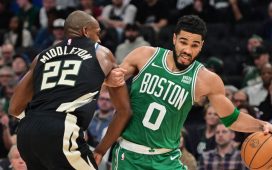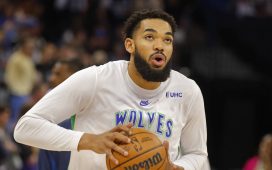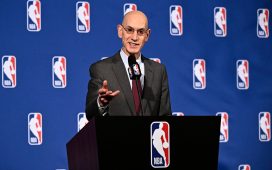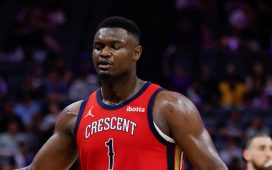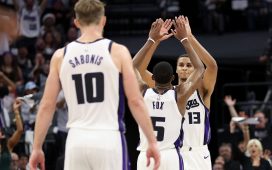Over the summer, Philadelphia 76ers guard Ben Simmons requested a trade, initiating a standoff that has dragged into the regular season.
The organization fined Simmons repeatedly for missing practices, meetings and preseason games, according to ESPN. Simmons did not report to the team until near the end of the preseason and was suspended for the regular-season opener for conduct detrimental to the team. Simmons likely will not play for the 76ers again for a long while, if ever. Philadelphia hosts the Nets on Friday.
In response to a report from The Athletic on Friday that Simmons had said he was mentally unprepared to play, 76ers forward Tobias Harris wrote in a tweet: “And we’ll respect his privacy and space during this time. When he’s ready, we will embrace our brother with love and handle our business on the court. That’s it, that’s all.”
Here’s how the situation evolved, where it stands and what it could mean for the N.B.A.
Why is Simmons so unhappy in Philadelphia?
Technically, we don’t know. Simmons hasn’t said anything publicly. Much of this has played out through anonymous reports in the media. There have been some signals from Simmons’s Instagram page, such as when he liked a post detailing how much the Sixers could fine him for missing games and practices.
The tension between Simmons and the Sixers has been festering for years, despite Simmons’s signing an extension in 2019. Now in his sixth season, he hasn’t really changed much as a player (he missed his first season with a foot injury). He is one of the most versatile playmakers in the N.B.A. and an excellent defender, but he has not developed a jump shot, which has made him a liability on the offensive end in multiple playoff runs. He’s also a career 59.7 percent free-throw shooter, which means teams often foul him on purpose at the end of games.
In December 2019, Brett Brown, the former 76ers coach, publicly begged Simmons to take more 3s. One month later, Brown told reporters that he had “failed” in his mission.
Even though Doc Rivers replaced Brown before last season, there hasn’t been much difference. Rivers was Simmons’s steadfast defender last year, but after the Atlanta Hawks eliminated the Sixers in the Eastern Conference semifinals, Rivers told reporters that he didn’t know whether Simmons could be a point guard for a championship team. It’s highly unusual to see a coach publicly criticize his own player minutes after a tough playoff loss.
On Thursday, Daryl Morey, the team’s president of basketball operations, said on a local Philadelphia radio station: “Doc Rivers defended Ben Simmons more than any human on Earth, maybe ever. If someone wants to interpret one comment out of 10,000, I don’t think that’s very fair to the organization or Doc Rivers.”
He added, “To me, it’s all some sort of like, you know, pretext to do something larger by his agent.”
What is Daryl Morey’s trade history?
Morey recognizes the value of an All-Star, even if that player’s game is limited. He has never been shy about wheeling and dealing, typically swings big and often ends up on the right side of trades.
Morey made an eye-popping 70-plus trades during his 13 seasons as general manager of the Houston Rockets and has already made several deals since joining Philadelphia in 2020. His most noteworthy deal helped shape the modern N.B.A.: Morey plucked James Harden from his reserve role with the Oklahoma City Thunder in 2012 for Jeremy Lamb, Kevin Martin and draft picks. In Houston, Harden became the focal point of an offensive scheme that centered 3-pointers and high-percentage shots like layups and dunks.
Two of Morey’s most memorable other deals involved Chris Paul. Morey landed Paul in Houston in 2017 for a package that sent several players, including Patrick Beverley, Montrezl Harrell and Lou Williams to the Clippers. In 2019, Morey acquired Russell Westbrook for Paul and a package of draft picks.
How does Simmons fit into the larger theme of player empowerment in the N.B.A.?
In recent years, some prominent players have leveraged their looming free agency to force trades to where they want to go. Anthony Davis, for example, got to the Los Angeles Lakers from the New Orleans Pelicans this way.
What’s happening with Simmons, though, is unprecedented because of how much time is left on his contract. Simmons is not a free agent until after the 2024-25 season. Even when James Harden, then with the Houston Rockets, forced his way to the Nets, he had just two years left on his deal. In theory, Simmons shouldn’t have much leverage. The closest comparison is Paul George, who had just signed an extension in Oklahoma City before engineering a trade to team up in Los Angeles with Kawhi Leonard. The difference is that the Thunder quickly acquiesced to George’s request, while the Sixers have been unwilling to do so with Simmons.
“Player empowerment” is also difficult to gauge in this situation because it’s not clear what Simmons’s value is. While he has made multiple All-Star teams and is one of the best defensive players in the N.B.A., his unwillingness to shoot and his shrinking in playoff games have hurt his trade value. At least so far, teams are unwilling to throw in the kitchen sink and more to obtain Simmons. So is it player empowerment if the player is currently not empowered?
Could N.B.A. Commissioner Adam Silver intervene at some point?
The league has rarely publicly intervened in standoffs between a player and a team, and it is uncertain what, if anything, Silver can do to move the situation along under the N.B.A.’s collective bargaining agreement.
The N.B.A. stepped in when the New Orleans Pelicans attempted to bench Anthony Davis in 2019 following his agent’s public request for a trade. Davis and Simmons share the same agent in Rich Paul, however the two scenarios are otherwise vastly different. Paul made the trade request for Davis in early 2019 with Davis set to become a free agent in the summer of 2020. The N.B.A. fined Davis $50,000 for the public trade request. Simmons has four years and $147 million left on his contract.
“It’s something you never like to see as a league,” Silver recently told ESPN of Philadelphia’s situation.
What does the absence of Simmons mean for the rest of the Eastern Conference?
We’ve spent a few seasons watching The Process come tantalizingly close to fruition.
Remember, Simmons and the 76ers were only a cruel bounce away from qualifying for the Eastern Conference finals in 2019 when they were eliminated in the semifinals by Kawhi Leonard’s soft touch on a buzzer beater for the Toronto Raptors in Game 7.
An engaged Simmons, the one who is a three-time All-Star, fantastic distributor and a disruptive force on defense, lifts Philadelphia to among the top of the Eastern Conference contenders.
Philadelphia earned the Eastern Conference’s top seed last season with a record of 49-23, and Joel Embiid is talented enough to strike fear in any playoff opponent. But expect Philadelphia to regress without Simmons or some type of a return in a trade for him and for teams like the Nets, Milwaukee Bucks and Miami Heat to finish atop the Eastern Conference standings.
What are the larger implications of Simmons’s actions?
Daryl Morey and Doc Rivers have said publicly that they want Simmons back and playing, though Morey is still trying to trade Simmons but said he doesn’t want role players in return.
If the Sixers are successful in getting Simmons back on the court, then the dispute becomes a moot point. However, it would signal that teams might be less willing to give in to trade demands going forward.
But if Simmons still doesn’t return, both sides will enter treacherous terrain. For Simmons, he likely will lose significant money during his athletic prime to fines and unpaid salary. Morey has said that this saga could drag on for the rest of Simmons’s contract. This would mean that the Sixers would spend Joel Embiid’s prime with a gaping hole in their roster that would limit their ceiling.
As for the league, if Simmons becomes the latest star player, after James Harden, Anthony Davis and Paul George, to engineer his own path independent of the organization’s wishes, it could affect the new collective bargaining agreement, which could come into effect in 2024. League owners might want harsher penalties for players who try to force their way off teams. (Conversely, there likely would be significant pushback from the players’ union on this. After all, teams trade players all the time despite signing them to play for their particular franchise.)

